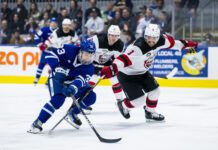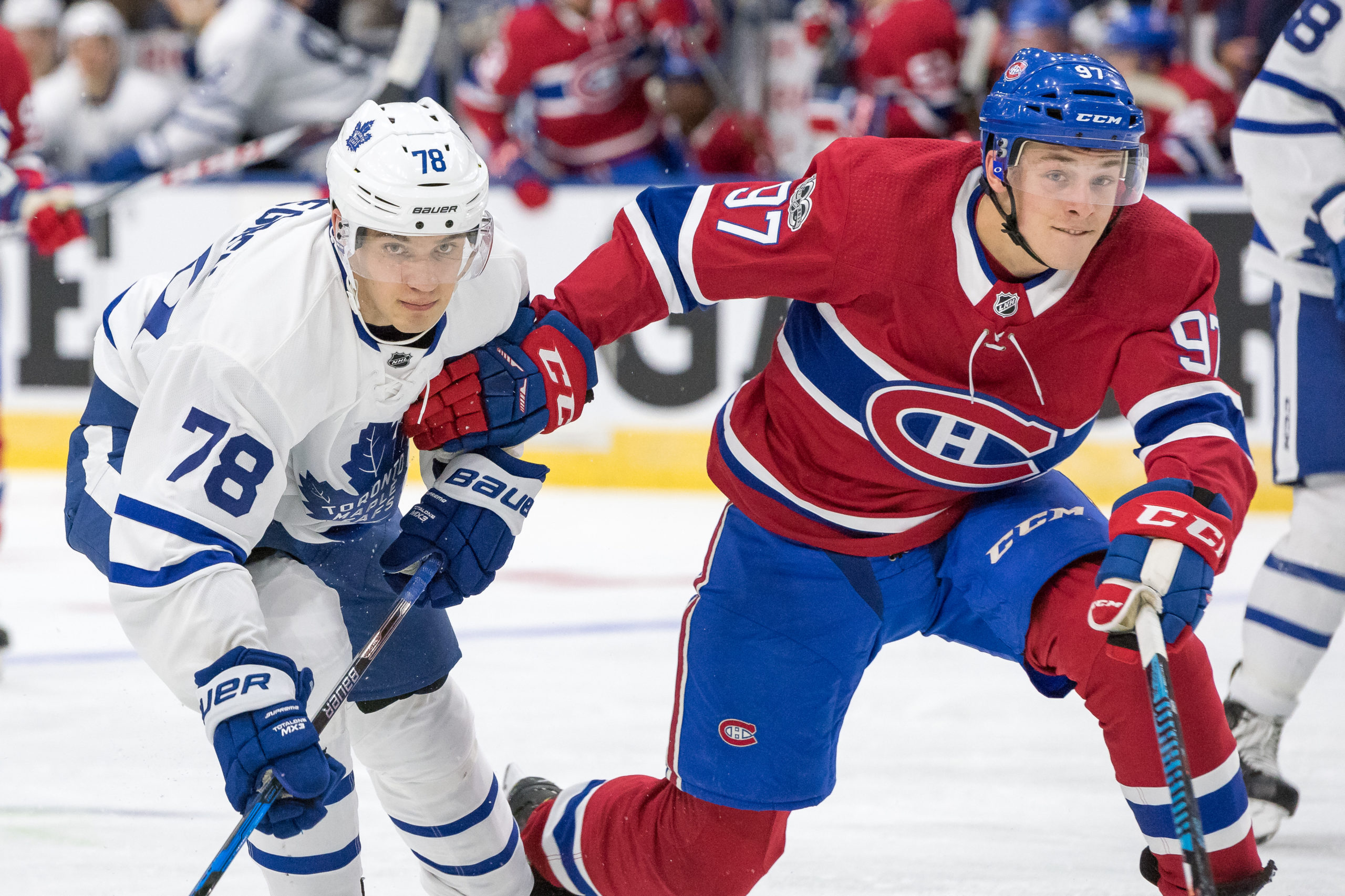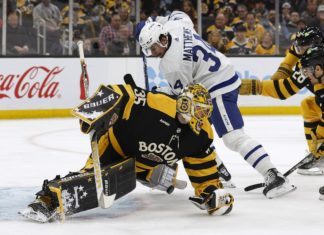Toronto Marlies head coach Sheldon Keefe joined Leafs Lunch on Tuesday to discuss the Marlies’ playoff run, the return of Andreas Johnsson and Travis Dermott, the winning vs. development balance, and the development of Timothy Liljegren.
What an incredible year it has been for the Toronto Marlies. How would you describe this season for you compared to the last few seasons that you’ve been a head coach of the team?
Keefe: Every year is unique in its own way. This one is no different. This year, we’ve had a little bit more stability in terms of our roster and our lineup. There has been a lot less movement, be it callups or injuries at the NHL level, or just different trades and things of that nature. The last two years, those have really impacted our lineup. This year, there has been a lot more stability, save for the likes of Kapanen and Dermott and Johnsson and Justin Holl [going up] for part of the season. Things have been pretty stable with our lineup. We’ve known for the most part who our group is and have been able to work with them. That’s been a little bit of a luxury that we haven’t had in previous seasons. It’s something that is rare at the American Hockey League level.
We were talking about the impact that Andreas Johnsson and Travis Dermott and the impact they had in Game 5. It’s not always easy for a player to come down from the NHL level, especially from a playoff series like the one the Leafs played against the Bruins. Why was that transition kind of seamless for those two players?
Keefe: I think a big part of it you can attribute to their personality. Both guys are very positive people with great energy about them. I don’t think in any way do they feel they’re above this or that playing at this level is beneath them coming off of just finishing playing a Game 7. They were excited to come in. The circumstances were that it was an elimination game for both games, with a Game 5 in a best-of-five series. They were excited to be able to come in and make an impact. The other part of it is that both players — I listened to both of their interviews — said it felt like home, like this was where they’ve spent time and where they’ve been playing. They know the players and coaches, and what the expectations are. Those type of things make for a more seamless transition. Certainly, it’s a nice luxury for us to be able to add them in a game of that magnitude and we’re excited to have them moving forward.
How do you keep a goalie mentally in it when he is working hard — he set the franchise record, Garret Sparks — and he sets the accolades and wins the awards, but there is a good chance he is not going to be the guy for the big club next year. How do you keep a guy like that focused?
Keefe: I think it’s pretty easy with Garret, frankly. When I spoke to him when he came down to us early this season out of training camp after he cleared waivers to play at the AHL level, he was obviously disappointed because he wanted to play in the NHL, but he was excited to have a chance to just commit to having a great year at the AHL level. He hasn’t been able to stay healthy and play consistently in previous seasons. He was excited to be able to do that. He wanted to put himself in a situation where he would never be able to clear waivers again.
The way for that to happen is for him to be able to stay healthy and dominate the league. He’s been able to do that. Credit to him for doing so. He puts himself in the position where it makes for a very difficult situation for everyone involved, be it the Maple Leafs or other teams around the league. If you’re a player, that is what you want to be doing. It is important we keep players motivated and keep pushing guys here to make difficult decisions at the higher levels. Garret has followed up what he set out to do and credit to him for doing that.
If you look at any great NHL team, right there is an AHL team that is producing players, developing players, and having success. How do you manage developing these guys — which you’ve done such a good job of — and winning, combining the two to make these players as ready as they’ve been to join the Toronto Maple Leafs?
Keefe: There is a lot of things that come into play with that. First of all is the identification of good players from drafting or free agency, or what have you. Those are things that happen over my head in the organization. The Leafs have done a good job of bringing in players and having good young players for us to work with and develop, and also supplementing that with really good veteran players that can lead the way and have good work habits and are good pros. All of that creates a very healthy and competitive environment that, we believe, allows our players to thrive.
Add in the fact that we have a lot of great resources here with the player development staff that I think is just world-class as far as the things they do. In many ways, I look at my job as the facilitator in order to make all of these things work each and every day and do that within a team environment, while still making plans for each guy and identifying weaknesses and working at them — all of those types of things.
The organization as a whole has really contributed to the success of the Marlies and the individual players that have found their way through the system here to be able to be productive Maple Leafs now. It’s been exciting to be a part of.
The entire city would love to see the Leafs acquire a right-handed shot on the blue line that is not too expensive, that can be dynamic, that can also be responsible in their own end. On that note, how has Timothy Liljegren been this season?
Keefe: He’s been good. It’s not easy to be an 18-year-old defenseman in the AHL. There have certainly been times when you can tell he’s an 18-year-old defenseman playing in the American league and he’s trying to find his way and figure out how to use his unique skill set that he has — not only in a league with faster men and all of those types of things, but a smaller ice surface and a different style of play than he’s accustomed to. That’s taken some time, but he’s been a constant on our power play and really helps us there. He moves the puck really well and efficiently. Perhaps the thing I’m most impressed with is how physical he’s been and how he’s handled the physical play. At times, he maybe loses battles, but he gets right up and gets right into it. He’s not shy; he’s not afraid. Those are very good signs because the skill set is a very good one, for sure. As he continues to mature, and gets quicker and stronger, all of these things will just thrive that much more. We’re excited for him for sure and we think this season has been a very productive one.

































